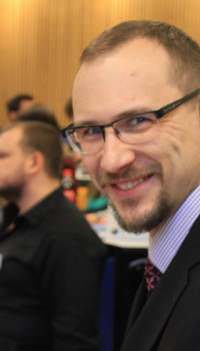| An estimate of the USA scientific community’s representative of G20 |
 |
 |
An estimate of the USA scientific community's representative of G20 and the role of Russian Summit «Group-20» in St. Petersburg 2013The Interview with Roman Sidortsov
D.Borisov: What do you think about G20? Is it really working or not and why? Currently, what is the role of G20 for world economy, international cooperation, for world financing system, and etc? R. Sidortsov: It is rather difficult to give a definitive answer to this question. However, it is critical to note that the G-20 countries work on very complex issues that no country is capable of solving by itself. Let's take the stability of the world's financial system as an example. The key to a successful resolution of this issue is proactive actions premised on international coordination. Nowadays, the problem of faulty mortgages in the state of Florida (for example) is no longer the problem of this state or the United States alone. As the financial crisis of 2008 showed us, such a problem is of global significance. Yet it would not be fair to say that the G-20 does not have any problems. It is widely known that several economic powers, Norway for example, were left out of the group. How are nation-states supposed to have a meaningful conversation about energy issues in Europe without participation from Norway? All in all, the G-20 is a necessary forum for working on issues that directly impact every-day lives of the majority of the world's population. While politicians give big speeches, people from Kazan' to Kansas are worried about simple but very real issues - jobs, their kids' education, the welfare of their families, etc. In the end, the main goal of the G-20 is solving these kinds of problems. D.Borisov: How do you think what could be interesting in this event and meeting for your country or others states? R. Sidortsov: Because I represent both the United States and Russia, I am interested in seeing whether the situation in Syria will impact the outcome of the talks on the issues that are not directly related to the crisis. The G-20 summit in St. Petersburg was supposed to be a meeting on economic issues and I would like it to remain this way. D.Borisov: What are the main\key question for EU (France, Germany, Great Britain), USA, South Korea, China and others countries? Which issues are the most important or difficult (for discussion)? R. Sidortsov: I will comment regarding the United States. In my view, this issue is coordination of financial policies to achieve long-term sustainable economic growth. The world's financial system is in need of structural changes and such changes will not be possible without changes in national financial systems. D.Borisov: Is it possible that the Summit in Saint - Petersburg (Russia) will be solving not only economical problems and what are they? R. Sidortsov: As I remarked above, I do not want to see this happen. The answer to this question will depend how far the situation in Syria will escalate D.Borisov: How can you evaluate the role of Russia as the chairman of G-20? R. Sidortsov: I think that Russia took its role as president of the G-20 very seriously. D.Borisov: What aspects are weak or strong? (I mean Russian approach as summit's chairman) R.Sidortsov: It is hard for me to answer this question because I am currently in the United Kingdom. However, according to Western news outlets, Russia came to the summit well prepared. D.Borisov: Which directions are you recommend for emphasis as main on Summit? R.Sidortsov: I would like to see G-20 leaders find the time and strength to separate the situation in Syria from the issues that were on the agenda originally and, hopefully, make progress on both. According to news outlets, the situation in Syria is critical; innocent civilians, women, and children lose their lives every day. Yet we cannot forget that 16,000 children die daily from hunger-related causes. Solving the world's economic problems will help to change this terrible statistic. Therefore, it is important to keep working on these problems even in the face of a looming humanitarian crisis. D. Borisov: What are the expected results of this summit? R. Sidortsov: Before the situation in Syria got out of hand, I hoped to see progress on tax avoidance, structural changes in the world's financial system, and transition to clean energy sources. Because of the crisis, I would be glad to see progress on one of these issues. 5 September 2013
Set as favorite
Bookmark
Email This
Hits: 7770 |
 An estimate of the USA scientific community’s representative of G20
An estimate of the USA scientific community’s representative of G20 During the Summit «G20» in the city of St. Petersburg (Russia, 5-6 September 2013), the questions of informational and practical magazine «The Industrial North» kindly agreed to answer an american expert and well-known in the world scientific community - R.Sidortsov.
During the Summit «G20» in the city of St. Petersburg (Russia, 5-6 September 2013), the questions of informational and practical magazine «The Industrial North» kindly agreed to answer an american expert and well-known in the world scientific community - R.Sidortsov.

